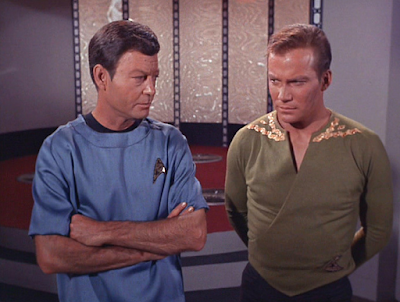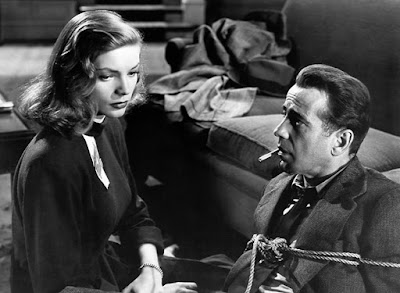 |
| "Dammit, Jim, I'm a doctor, not a sushi chef!" |
Direct Address
- “Dammit, Jim, I’m a doctor, not a sushi chef!” protested Doctor McCoy.
We can all agree that doctor should be lowercase here and Doctor McCoy should be capitalized. The first is simply an ordinary noun and needs no special treatment: a doctor, the doctor, my doctor. The second is an honorific in front of a name, and as with Captain Kirk, Mr. Sulu, or Lieutenant Uhura, it should be capitalized.
Things get more contentious when the honorific steps into the shoes of a name. Dr. McCoy’s dialogue is an example of direct address (also called the vocative case): he’s speaking to someone—Kirk—directly. When he says “Dammit, Jim,” the use of a capital for Jim is obvious; it’s a name. But what if McCoy were addressing him as captain? What about buster?
- “Dammit, C/captain, I’m a doctor, not a trapeze artist!”
- “I’ll darn well sass you if I feel like it, b/Buster!”
Up Style vs. Down Style
The Chicago Manual of Style, the bible of copy editors, is firm on the use of capitals in direct address. In an online Q & A column, Chicago’s editors write, “It doesn’t matter what the word is: captain, coach, aunt, joker, brain. If it’s used in place of a name, cap it.”
- “Dammit, Captain, I’m a doctor, not a trapeze artist!”
- “I’ll darn well sass you if I feel like it, Buster!”
On the other hand, well-known grammar arbiter Grammar Girl writes, “In cases where [honorifics] stand alone, even in direct address, they are lowercase.” She offers as examples “Hey, mister, look out for that pelican!” and “Gee, doctor, it hurts when I stick out my tongue.”
- “Dammit, captain, I’m a doctor, not a trapeze artist!”
- “I’ll darn well sass you if I feel like it, buster!”
The generous use of capitalization is sometimes referred to as up style, while using capitals more sparingly is called down style. Manuals like Chicago, which tend to embrace up style for direct address, are generally geared towards formal writing—say, for academic, government, or business contexts. Pick up any popular book, however, and you’ll most likely see down style.
But that doesn’t mean capitalizing honorifics is a matter of personal whim. There are a few words that even the most formal style guides won’t capitalize, and some words that fiction editors would wince to see in lowercase.
 |
| Do go haunt someone else, Mother! |
Relativity: Family Titles
Mom (or Mum), Dad, Mother, and Father are always capitalized—when they’re used like names. Try substituting a name (we’ll use Spock) for the title in question. If it makes sense, cap it; if it doesn’t, use lowercase.
- My mom said she’d drive us to the rave. (my Spock X)
- Are you going to bake a file into Father’s cake? (Spock’s cake ✓)
- Do go haunt someone else, Mother! (haunt someone else, Spock ✓)
- All the dads are wearing tutus to the barbecue. (all the Spocks X)
You can apply the Spock method to other family members as well:
- Who gave Grandmother a litre of vodka? (who gave Spock ✓)
- Phoebe inherited the time travel machine from her grandpa. (her Spock X)
- One should not take advice from one’s disreputable uncle. (one’s Spock X)
- I already knew you were a witch, Auntie. (you were a witch, Spock ✓)
- Don’t let Uncle bring his Jello salad. (don’t let Spock ✓)
Of course, family titles are always capitalized when they’re followed by a name, in the same way you’d capitalize Doctor Zhivago or Captain America.
- our Grandma Eng (but our grandma, Eng)
- his Uncle Ahmed (but his uncle, Ahmed)
- Flora’s Cousin Judith (but Flora’s cousin, Judith)
Some family titles are less obviously capitalized. Brother or sister, for example, could mean any old schmo.
- Can you spare a dime, brother?
- You’re a tough cookie, sister.
Even when talking to your actual sibling, you might still prefer a more casual “Nice one, bro.” In some cultures titles like uncle and auntie are applied generally and not just to your parents’ siblings; an author might decide to convey this by keeping them lowercase.
 |
| You’re a tough cookie, sister. |
Sir, Ma’am, and Nicknames
For reasons lost in the mists of time (or at least not immediately findable on the Internet), the following words are never capitalized when used without a name:
- sir
- ma’am / madam
- my lord
- my lady
(Hard-core grammar nerds can confirm this in section 8.32 of the Chicago Manual.) Even should you happen to speak to the Queen, she would only merit lowercase:
- “Your corgis are eating my shoe, ma’am.”
Nicknames, on the other hand, are always capitalized, since they’re another type of name—Bucky, Stretch, Chewy, Four-Eyes—but sometimes the line between a personal nickname and a generic descriptive term can get kind of fuzzy. Consider kiddo, genius, loser, killer, and sunshine. Of course, up style would cap these in any case (provided they were used in place of a name). If you’re using down style, you might want to think about the difference between a word that’s specific to an individual and one that’s used less discriminately. John Henry Holliday was known as Doc at the O.K. Corral, but Bugs Bunny says “What’s up, doc?” to a variety of characters.
When to Capitalize Direct Address: The Takeaway
Those of you looking for hard and fast rules on this issue are doomed to disappointment. As with so many grammar questions, the answer boils down to context and consistency. What degree of formality does your reader expect—are you writing a business letter or a blog post? Once you’ve chosen your style—up or down—apply it consistently. Remember to capitalize Mom and Dad where appropriate (calling on Mr. Spock for help as needed), and leave sir and ma’am lowercase. After that, dear reader, you’re on your own.


